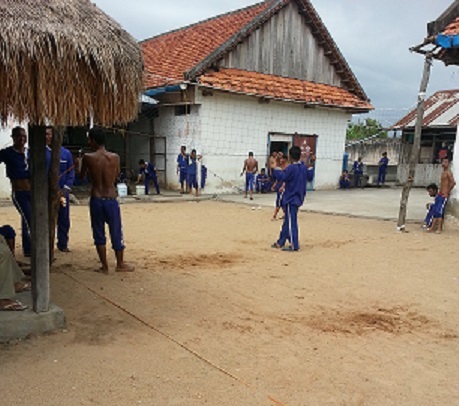
A handful of prisoners in blue jumpsuits are playing a lazy game of volleyball in the hot sun in the center of the Pursat prison courtyard; another is cutting hair in a tiny shack behind the volleyball court; the majority are squatting idly, hanging their arms through the wire fence that separates their cells from the yard. The more industrious, or, perhaps, merely those fortunate enough to have been assigned a task to pass the time, either carry garden tools back and forth across the yard, or take turns tediously pumping water from the only well into plastic buckets. All this takes place outside the window of the hut that passes for an infirmary, where Khek sits across from me on the edge of a stripped-down, wooden bed. An inmate-patient writhes in pain behind Khek on the same bed, groaning and clutching his stomach as another inmate massages a balm into his back. I do not believe I am imagining the disappointment and sadness in nineteen-year-old Khek’s eyes for being back here after just having been acquitted this past winter.
On May 12, 2012, Khek was arrested on suspicion of stealing a television. He had been working as a caretaker for a local fishery when the television disappeared from a house near where he worked. The owners of that house pointed the finger at Khek, having long suspected that he and his group of friends were in some kind of gang; but, they were wrong. In fact, Khek was at his friend’s wedding in a village far from his workplace on the day the television was stolen. Many witnesses could have confirmed this, but the police never investigated his alibi after they arrested him at his work the next day. He was interrogated in the local police post, then the district post, then the court, before finally being brought to Pursat prison. He never confessed to the crime, even when threatened with a longer prison sentence.

Human Rights Day Pursat Prison event
On December 10, 2012, IBJ organized a large event in Pursat Prison to celebrate Human Rights Day. Ten IBJ lawyers, a dance teacher, a comedian, two music teachers, two American-Cambodian refugees, a spoken word artist and an artist from Phnom Penh gathered in the prison for a three-hour program that allowed the 223 prisoners the rare opportunity to exercise their creativity. Most inmates in Pursat prison know about IBJ’s work because of this event. Khek, for one, did not know how to contact an IBJ lawyer until he met one on Human Rights Day. That lawyer represented Khek at his trial on January 9, 2013, when he convinced the judge to acquit him, partly by drawing attention to the young man’s eagerness to confront his accuser in court .

Human Rights Day Pursat Prison event
When Khek came home to his village, he discovered that one of his friends had in fact stolen the television. Unfortunately, he did not use the occasion as an opportunity to separate himself from that group and he paid the price for this failure on May 24, 2013, when he agreed to hold a large sum of money for one of those friends. This friend did not tell Khek where the money came from, but promised that the two of them would use it soon to go on a vacation together. Unsurprisingly, the young man had stolen the money and after he entrusted it to Khek he disappeared, leaving the latter to face the consequences alone. Sure enough, the police arrived at Khek’s home the next day and found the stash of money. Now he is charged with theft and once again waits in uncertainty as he shares a small cell with as many as six other prisoners.
Khek is the third of four children and his family visits him once or twice per month. When he gets out of prison he plans to either help his father work construction, or, in all seriousness, become a monk. The latter course attracts him because he is afraid that no employer will trust him since he has been to prison twice, even though the judge acquitted him the first time and circumstances may mitigate the gravity of his second offense. He says that he has met young men in prison who successfully pursued a religious life after serving their sentences.
Mr. Roth Chanthol, the IBJ lawyer currently working in Pursat, will represent Khek for free, but it will take at least six more months before he gets back in front of a judge. Recidivist cases like Khek’s are nearly as frustrating for the lawyer as they are for the client, but Mr. Roth knows that in order to make the justice system fairer for all Cambodians he must faithfully and vigorously represent every accused person, not only those with the most tragic story or the most convincing alibi. In order to accomplish IBJ’s goal of building a sustainable legal culture which protects the rights of all accused persons, cases like Khek’s are among the more important that IBJ lawyers take on.



